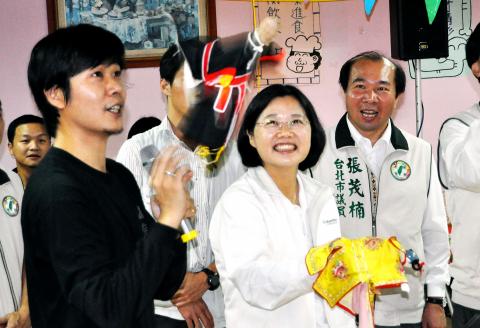President Ma Ying-jeou (馬英九) and Democratic Progressive Party (DPP) Chairperson Tsai Ing-wen (蔡英文) are locked in a tight presidential election race, with the latest media poll putting the lead Ma holds over Tsai within the poll’s margin of error.
A poll result released by the -Chinese language China Times yesterday showed that if only two pairs of presidential candidates were fielded, Ma and Premier Wu Den-yih (吳敦義) on the Chinese Nationalist Party (KMT) ticket against Tsai and DPP Secretary-General Su Jia-chyuan (蘇嘉全) on the DPP ticket, the support rate for the Ma-Wu ticket would be 44.3 percent, while it would be 41 percent for the Tsai-Su ticket.
Although the poll gave Ma a lead of 3.3 points over Tsai, it was the closest gap between the two candidates in the presidential surveys that the China Times has conducted in recent months.

Photo: Taipei Times
If People First Party (PFP) presidential hopeful James Soong (宋楚瑜) were to participate in the January presidential election along with his running mate, academic Lin Ruey-shiung (林瑞雄), the Ma-Wu ticket would garner 41.7 percent support, while the Tsai-Su ticket would gain 38.2 percent and the Soong-Lin ticket would receive 10.4 percent, the poll showed.
The poll questioned 1,074 people and had a margin of error of 3 percentage points.
On Monday, xfuture.org, a Web site with a platform similar to the stock market that allows users to predict the results of future events, said Tsai held a slight lead over Ma in terms of her percentage of votes and her possibility of getting elected.
As of Saturday, the exchange predicted that Tsai would receive 49.5 percent of votes, Ma would get 48.3 percent and Soong would take 7.5 percent. Tsai has held the lead in the past nine days, and in the past three days her margin has exceeded 1 percentage point.
On the possibility of being elected, on Saturday the exchange gave Tsai 44.8 percent, Ma 41.5 percent and Soong 13.5 percent.
It said Ma’s chances of winning the election rose steadily from early September, peaking on Oct. 16 when he was 18.7 percentage points ahead of Tsai. However, that lead narrowed after Ma floated the possibility of signing a peace pact with China within the next 10 years.
According to National Chengchi University’s Prediction Markets Center, prediction markets efficiently collect effective information through a futures or stock-trading mechanism that relies on the wisdom of the public, who buy and sell contracts of future events on the market.

DAREDEVIL: Honnold said it had always been a dream of his to climb Taipei 101, while a Netflix producer said the skyscraper was ‘a real icon of this country’ US climber Alex Honnold yesterday took on Taiwan’s tallest building, becoming the first person to scale Taipei 101 without a rope, harness or safety net. Hundreds of spectators gathered at the base of the 101-story skyscraper to watch Honnold, 40, embark on his daredevil feat, which was also broadcast live on Netflix. Dressed in a red T-shirt and yellow custom-made climbing shoes, Honnold swiftly moved up the southeast face of the glass and steel building. At one point, he stepped onto a platform midway up to wave down at fans and onlookers who were taking photos. People watching from inside

MAKING WAVES: China’s maritime militia could become a nontraditional threat in war, clogging up shipping lanes to prevent US or Japanese intervention, a report said About 1,900 Chinese ships flying flags of convenience and fishing vessels that participated in China’s military exercises around Taiwan last month and in January last year have been listed for monitoring, Coast Guard Administration (CGA) Deputy Director-General Hsieh Ching-chin (謝慶欽) said yesterday. Following amendments to the Commercial Port Act (商港法) and the Law of Ships (船舶法) last month, the CGA can designate possible berthing areas or deny ports of call for vessels suspected of loitering around areas where undersea cables can be accessed, Oceans Affairs Council Minister Kuan Bi-ling (管碧玲) said. The list of suspected ships, originally 300, had risen to about

A Vietnamese migrant worker yesterday won NT$12 million (US$379,627) on a Lunar New Year scratch card in Kaohsiung as part of Taiwan Lottery Co’s (台灣彩券) “NT$12 Million Grand Fortune” (1200萬大吉利) game. The man was the first top-prize winner of the new game launched on Jan. 6 to mark the Lunar New Year. Three Vietnamese migrant workers visited a Taiwan Lottery shop on Xinyue Street in Kaohsiung’s Gangshan District (崗山), a store representative said. The player bought multiple tickets and, after winning nothing, held the final lottery ticket in one hand and rubbed the store’s statue of the Maitreya Buddha’s belly with the other,

Japan’s strategic alliance with the US would collapse if Tokyo were to turn away from a conflict in Taiwan, Japanese Prime Minister Sanae Takaichi said yesterday, but distanced herself from previous comments that suggested a possible military response in such an event. Takaichi expressed her latest views on a nationally broadcast TV program late on Monday, where an opposition party leader criticized her for igniting tensions with China with the earlier remarks. Ties between Japan and China have sunk to the worst level in years after Takaichi said in November that a hypothetical Chinese attack on Taiwan could bring about a Japanese